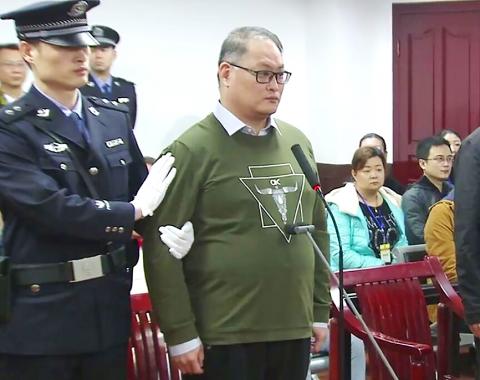Taiwan yesterday condemned the conviction of Taiwanese human rights advocate Lee Ming-che (李明哲) by a Chinese court, saying it is “unacceptable” that Lee should be found guilty of state subversion for advocating democracy and freedom.
“The nation cannot accept that Lee Ming-che has been convicted of such a crime as state subversion for sharing the ideas of democracy and freedom,” Presidential Office spokesman Alex Huang (黃重諺) said, calling for Lee’s immediate release.
Lee’s case has greatly damaged cross-strait relations and threatened Taiwanese belief in freedom and democracy, Huang said.

Photo: AFP / Yueyang Intermediate People’s Court
The Mainland Affairs Council also condemned the verdict, saying Lee’s online exchanges with his Chinese friends were an innocent effort to share Taiwan’s democratic experience, which did not compromise China’s safety and security in any way.
It was also unacceptable that former Democratic Progressive Party (DPP) legislator Wang Li-ping (王麗萍), who accompanied Lee’s wife, Lee Ching-yu (李凈瑜), to Yueyang, Hunan Province, to hear the verdict, was denied entry and deported, the council said.
China should ensure the safety of Lee Ching-yu and members of her group and their return to Taiwan, the council said.
It should also ensure Lee Ming-che’s health and right to family visits during his confinement, it said, adding that the government would continue its efforts to seek his return.
Politicians across party lines also condemned the verdict and urged the government to safeguard the rights of Taiwanese.
“There should not be, and could not possibly be, political prisoners in a truly democratic, free and law-observing country,” the DPP said in a statement.
The verdict “indicates China’s indifference to the universal values of democracy and human rights, and damages its international reputation, while hurting the feeling of Taiwanese,” the DPP said.
Beijing should respect Taiwan’s belief in democracy and freedom, as Chinese President Xi Jinping (習近平) said during the Chinese Communist Party’s (CCP) 19th National Congress last month, the DPP said.
The Chinese Nationalist Party (KMT) said the council needs to step in wherever Lee Ming-che’s rights are compromised during and after the trial, even though cross-strait relations and communication have cooled since the DPP administration took office.
The DPP administration would be sacrificing people’s rights for its ideology if it fails to communicate with Beijing over Lee’s condition, KMT spokesman Hung Meng-kai (洪孟楷) said.
The New Power Party (NPP) urged the government to take a tougher stance against China as cross-strait agreements are ineffective in Lee’s case, and passivity would only compromise personal freedom and the freedom of expression of Taiwanese.
Lee Ming-che is innocent and the Chinese government is guilty of illegally detaining him, violating human rights and cracking down on political dissidents, the NPP said.

Right-wing political scientist Laura Fernandez on Sunday won Costa Rica’s presidential election by a landslide, after promising to crack down on rising violence linked to the cocaine trade. Fernandez’s nearest rival, economist Alvaro Ramos, conceded defeat as results showed the ruling party far exceeding the threshold of 40 percent needed to avoid a runoff. With 94 percent of polling stations counted, the political heir of outgoing Costa Rican President Rodrigo Chaves had captured 48.3 percent of the vote compared with Ramos’ 33.4 percent, the Supreme Electoral Tribunal said. As soon as the first results were announced, members of Fernandez’s Sovereign People’s Party

EMERGING FIELDS: The Chinese president said that the two countries would explore cooperation in green technology, the digital economy and artificial intelligence Chinese President Xi Jinping (習近平) yesterday called for an “equal and orderly multipolar world” in the face of “unilateral bullying,” in an apparent jab at the US. Xi was speaking during talks in Beijing with Uruguayan President Yamandu Orsi, the first South American leader to visit China since US special forces captured then-Venezuelan president Nicolas Maduro last month — an operation that Beijing condemned as a violation of sovereignty. Orsi follows a slew of leaders to have visited China seeking to boost ties with the world’s second-largest economy to hedge against US President Donald Trump’s increasingly unpredictable administration. “The international situation is fraught

MORE RESPONSIBILITY: Draftees would be expected to fight alongside professional soldiers, likely requiring the transformation of some training brigades into combat units The armed forces are to start incorporating new conscripts into combined arms brigades this year to enhance combat readiness, the Executive Yuan’s latest policy report said. The new policy would affect Taiwanese men entering the military for their compulsory service, which was extended to one year under reforms by then-president Tsai Ing-wen (蔡英文) in 2022. The conscripts would be trained to operate machine guns, uncrewed aerial vehicles, anti-tank guided missile launchers and Stinger air defense systems, the report said, adding that the basic training would be lengthened to eight weeks. After basic training, conscripts would be sorted into infantry battalions that would take

GROWING AMBITIONS: The scale and tempo of the operations show that the Strait has become the core theater for China to expand its security interests, the report said Chinese military aircraft incursions around Taiwan have surged nearly 15-fold over the past five years, according to a report released yesterday by the Democratic Progressive Party’s (DPP) Department of China Affairs. Sorties in the Taiwan Strait were previously irregular, totaling 380 in 2020, but have since evolved into routine operations, the report showed. “This demonstrates that the Taiwan Strait has become both the starting point and testing ground for Beijing’s expansionist ambitions,” it said. Driven by military expansionism, China is systematically pursuing actions aimed at altering the regional “status quo,” the department said, adding that Taiwan represents the most critical link in China’s